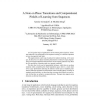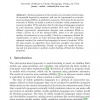853 search results - page 20 / 171 » Dyslexia and learning computer programming |
114
Voted
SIGCSE
2006
ACM
15 years 6 months ago
2006
ACM
By expanding the teaching styles used in computer science classrooms, we can expand the audience of students that enjoy and excel in technology. Rather than focusing on major curr...
95
Voted
JIIS
2008
15 years 11 days ago
2008
An ever greater range of applications call for learning from sequences. Grammar induction is one prominent tool for sequence learning, it is therefore important to know its proper...
115
click to vote
CONCUR
2006
Springer
15 years 4 months ago
2006
Springer
Boolean programs with recursion are convenient abstractions of sequential imperative programs, and can be represented as recursive state machines (RSMs) or pushdown automata. Motiv...
111
click to vote
GROUP
2009
ACM
15 years 7 months ago
2009
ACM
Scientiï¬c peer review, open source software development, wikis, and other domains use distributed review to improve quality of created content by providing feedback to the workâ...
142
click to vote
ILP
2004
Springer
15 years 5 months ago
2004
Springer
One challenge faced by many Inductive Logic Programming (ILP) systems is poor scalability to problems with large search spaces and many examples. Randomized search methods such as ...


